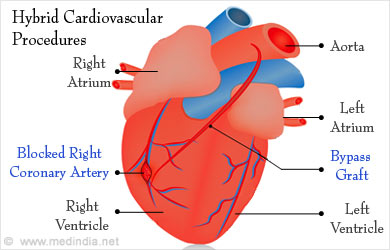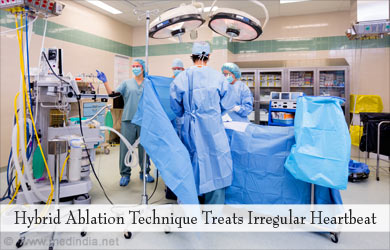What is Hybrid Heart Surgery?
Hybrid heart surgery is an advanced form of cardiothoracic surgery where open heart surgery is combined with a catheter-based intervention to treat heart disease.
Heart surgeries have undergone several advances in the past few decades. Open heart surgery, where an incision is made on the chest, was commonly done earlier for conditions affecting the heart like heart attack or heart valve disease. Newer techniques make use of catheters, which are passed through an artery, like the femoral artery and radial artery, into the heart. These were associated with lesser complications, but not suitable for all conditions. A newer approach makes use of both the procedures – open heart surgery and catheter-based approaches in the same setting within minutes, hours or sometimes few days between them. These procedures are called hybrid heart surgeries.

What are the Requirements for Hybrid Heart Surgery?
Some of the requirements for hybrid heart surgery include the following:
- A team of experts trained in carrying out the procedures involved. Open heart surgery is carried out by cardiac surgeons, while catheter-based approaches are carried out by interventional cardiologists.
- A larger than usual operating room to fit in all the necessary equipment
- Equipment to support both procedures that is well arranged so that it does not cause conflict in the procedures
Which are Some of the Hybrid Heart Surgeries Carried Out Nowadays?
Some of the hybrid heart surgeries carried out include the following:
- Hybrid CABG / PCI: CABG (Coronary artery bypass grafting), also called open heart bypass surgery, is a common surgical procedure used to treat blocks in the arteries supplying the heart that cause a heart attack. The blocked left anterior descending artery of the heart is bypassed by another artery, the left internal thoracic artery, obtained from the chest. This procedure is done through open surgery. However, there could be several other arteries that may also be blocked and require treatment. Multi-vessel disease is treated with an additional PCI, which makes the procedure a hybrid heart surgery. PCI or percutaneous coronary intervention uses a catheter to introduce stents into the other blocked arteries to keep them open. Newer stents release a medication (called drug-eluting stents), and have better outcomes. Coronary bypass can be done before or after PCI. Using the two procedures together allows for a smaller incision during the open surgery and a faster recovery following the procedure.

- Hybrid Valve / PCI: Heart valves are tissues that guard the openings of the chambers of the heart and ensure that the blood flows in a particular direction. Heart valves may be defective from birth or due to disease later in life. Minor defects may not require treatment. However, major defects may require the valve to be replaced. This is carried out with open surgery. Robotic surgery is also used, where incisions are smaller and therefore recovery is faster.
Patients who have a block in a coronary artery supplying blood to the heart muscle, along with a disease of a heart valve will benefit from a hybrid surgery. An open surgery is used only for the valve replacement, while PCI is used to open up the blocked coronary artery. This procedure is useful in high-risk patients who may not be able to withstand a major open surgery for both, the defective valve and the blocked coronary artery.
- Repair of Congenital Heart Disease: A congenital heart disease is a structural defect of the heart present since birth. Percutaneous procedures are not always adequate to treat heart problems resulting from a congenital heart disease. At the same time, open surgery may not be feasible in all cases. Hybrid surgery is often used in congenital heart problems, especially for a condition called hypoplastic left heart syndrome. In this syndrome, the left side of the heart is not well developed. Therefore, the body does not receive enough amount of oxygenated blood.
- Hybrid Endocardial and Epicardial Procedure for Atrial Fibrillation: Atrial fibrillation is a condition where the atria or the upper chambers of the heart beat irregularly. Medications are often used to treat irregularities in heart rhythm, though surgery may be required in some cases. Through an open surgery, parts of the atrial muscle are damaged, which later form scar tissue. The scar tissue blocks the passage of the abnormal impulses through the heart.
In a hybrid ablation procedure for atrial fibrillation, the muscle of the atrium on the outer side (epicardium) is damaged using laser etc. through an open surgery. In addition, the inner side of the atrium (endocardium) is scarred using a catheter-based approach.

- Treatment of Aneurysms Affecting the Thoracic Aorta: Aneurysm is a dilated artery, which if left untreated can even burst. The thoracic aorta is the initial part of the aorta in the chest. Since it is a major artery, rupture of the aorta can even result in death. Treatment of thoracic aorta aneurysm through a hybrid approach can result in better outcome for the patient.
What are the Advantages of Hybrid Heart Surgery?
Advantages of hybrid heart surgery include the following:
- There is no need for two separate procedures to treat heart disease
- Since the open surgery is less complex, the overall risk for the patient is lower, and yet the benefit achieved is similar
- Recovery is faster

What are the Disadvantages of Hybrid Heart Surgery?
Disadvantages of hybrid heart surgery are mainly related to the problems in setting up a hybrid operation theater. The operating room is more expensive to set up and requires more space.










